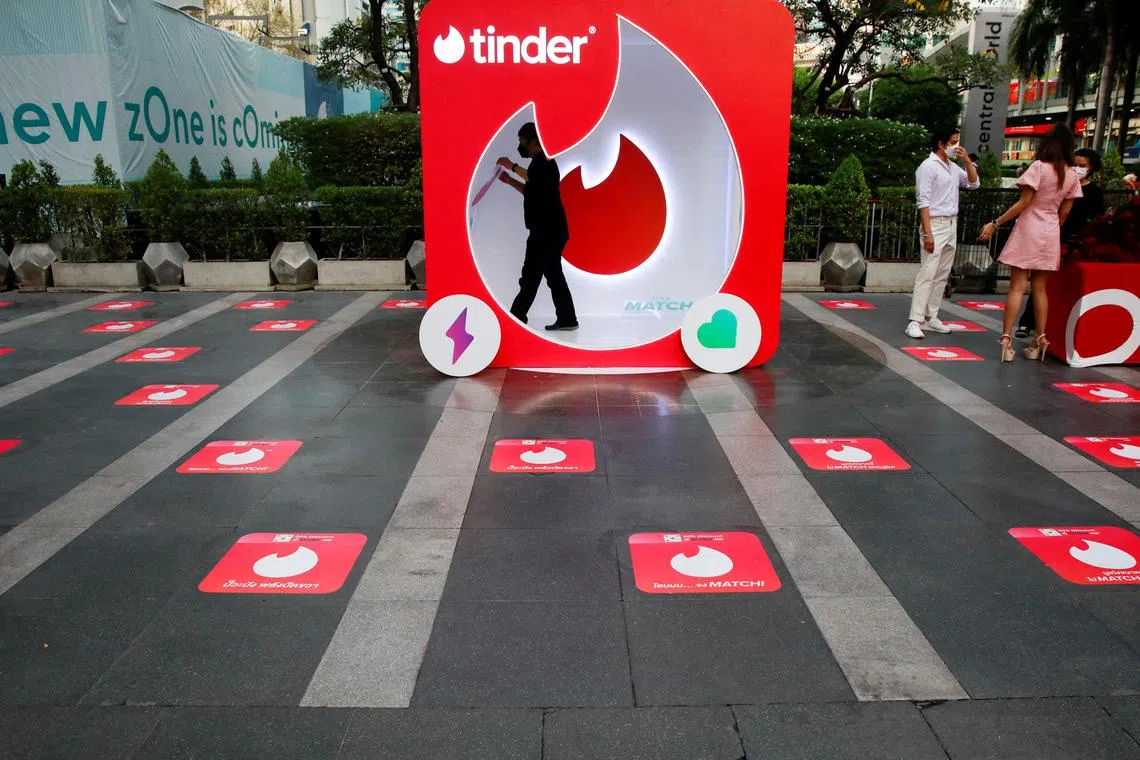Bumble and other dating apps move to friend zone in search of profits
Sign up now: Get ST's newsletters delivered to your inbox

Bumble, and Match – which owns Tinder – suffered dramatic slumps since the pandemic, and had turned to apps catering to friendly meetups.
PHOTO: REUTERS
Follow topic:
LISBON – Burnt-out love seekers are shunning dating apps in their millions, but the apps are trying to woo them back with a counter offer: If you do not want a lover, perhaps you just need a friend?
The giants of the industry – Bumble, and Match, which owns Tinder – have both created apps catering to friendly meetups, joining countless smaller platforms that have already entered the friend zone.
Bumble For Friends launched in July 2023 and, by the third quarter of 2024, had around 730,000 monthly active users, according to figures from market intelligence firm Sensor Tower.
Bumble has also acquired the Geneva app, which caters to people wanting to form groups around particular interests.
“It’s just the beginning of our vision to expand the company’s footprint and helping people find connections broadly,” Bumble chief executive Lidiane Jones said during the Web Summit in Lisbon on Nov 13.
Match, meanwhile, launched the Yuzu app in February targeting the Asian community in the United States, offering a choice between friendly or romantic encounters.
The group has also been testing a service dedicated to friendship in France on its dating app for older people, DisonsDemain.
Both companies have suffered dramatic slumps since the boom times of the Covid-19 pandemic, when millions turned to the apps during periods when governments restricted people’s movements.
‘App fatigue’
Sensor Tower said while Bumble For Friends was soaring, its dating app had shed 8 per cent of its monthly active users between the start of October 2023 and 2024 – the figure is now standing at 21 million.
Tinder, by far the biggest dating app with around 53 million monthly active users, saw a 16 per cent slump in the same period.
Ms Seema Shah of Sensor Tower said users were feeling “app fatigue”, adding: “It’s affecting all apps but in particular these dating apps. People are just kind of tired of it.”
Tinder was hit particularly hard as it targeted younger users between 18 and 22. “This is the same age group that likes to do a lot of things in person,” she said.
These declines are hitting the firms where it really hurts – the bottom line.
Match Group has shed more than US$40 billion (S$53.6 billion) from its value in three years.
Bumble achieved a valuation of more than US$20 billion when it went public in 2021, but it is now worth only about US$1.3 billion. The firm announced the layoff of a third of its workforce in February.
And success in the friend zone is far from assured, with plenty of apps already battling to attract future BFFs or “best friends forever”.
Novelty factor
The apps often cater to particular situations – WeRoad and TripBFF connect solo travellers, Wink and Plura help people find friends based on their interests.
French app Timeleft, launched in 2023, brings together six strangers every week for dinner at a restaurant.
The app has already organised dinners in 280 cities across 62 countries and is getting closer to profitability, co-founder Maxime Barbier told AFP.
He said diners were assembled using an algorithm enriched by the results of personality tests taken by the users.
For Mr Arthur Czubinski, a 32-year-old translator, it is a winning formula.
He told AFP he had been to 12 dinners organised by the app in just a few months. “Some of the tables have been incredible,” he said.
But Sensor Tower’s Ms Shah suggested the first flushes of success for friendship apps were at least partly down to novelty. She expressed doubt people would pay in the long term.
“It’s probably easier to find friends in your area if you join some activity or through your job,” she said. AFP

